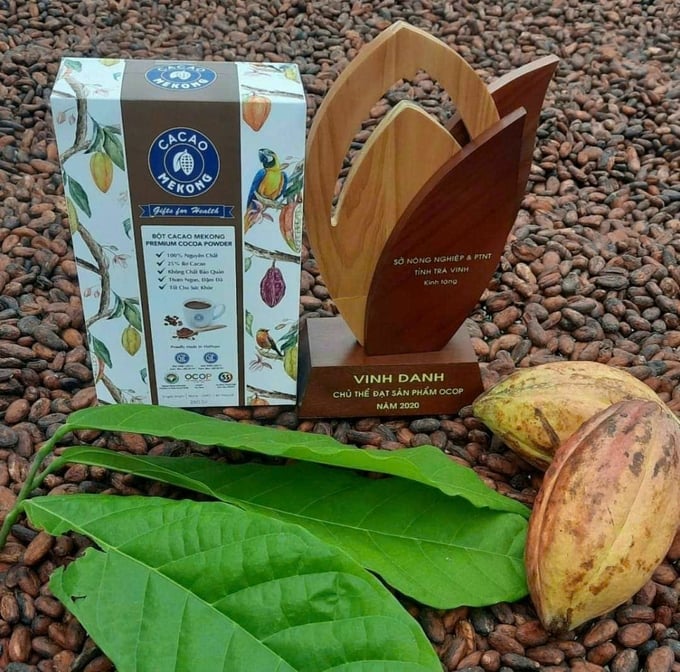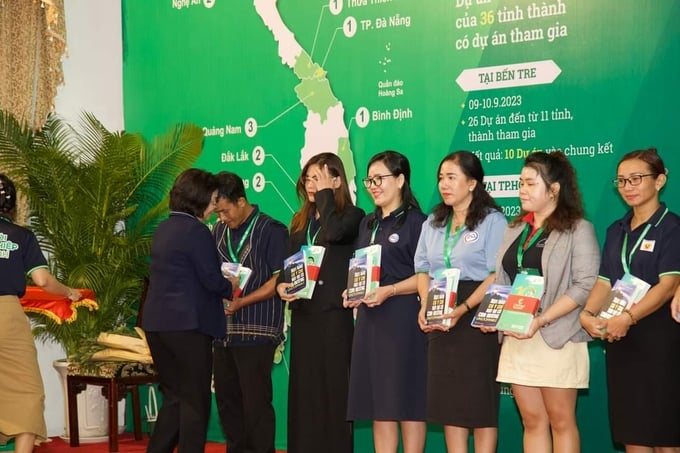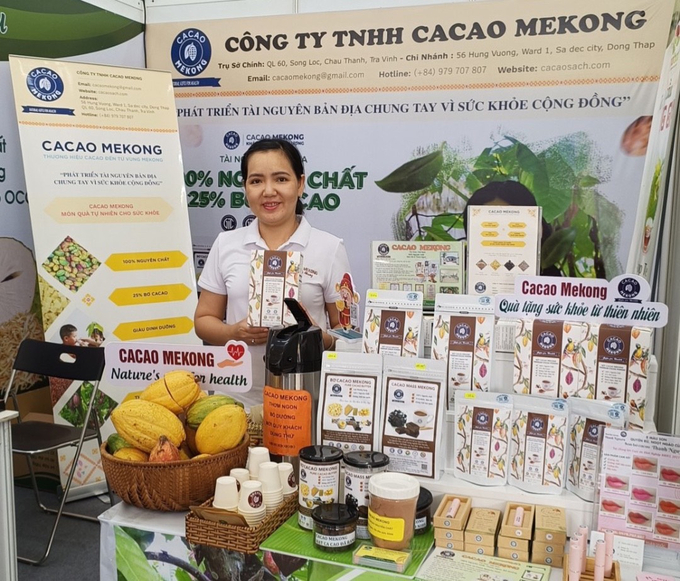May 29, 2025 | 01:34 GMT +7
May 29, 2025 | 01:34 GMT +7
Hotline: 0913.378.918
May 29, 2025 | 01:34 GMT +7
Hotline: 0913.378.918

Cacao Mekong Company’s products have been present in the markets of the United States, South Korea, Cambodia, and Laos. Photo: Ho Thao.
According to research, Vietnamese cocoa is assessed as one of the most delicious products in the world due to its characteristics of soil, climate, and fermentation process. Along with that, it has great development potential because cocoa trees can be intercropped with other fruit trees. However, in recent times, businesses have mainly focused on exporting raw cocoa beans and paid little attention to the processing industry, leading to unstable raw material purchasing prices and affecting growers' profits. Compared to many other crops, cocoa is often not favored by gardeners.
Typically, in Tra Vinh, about a dozen years ago, there were thousands of hectares of cocoa intercropped with coconut, but now there are only less than 50 hectares left. Recently, only when the quality of cocoa was shared on international forums did a number of domestic units begin to pay more attention to this crop and want to develop cocoa products into Vietnam’s valuable specialties.
Ms. Nguyen Thi Cam Nhung, Director of Cacao Mekong Company, shared: "After researching the cocoa processing process, we realized the great potential because many countries appreciate Vietnamese cocoa trees. Besides, Tra Vinh is a suitable locality for cocoa-coconut intercropping, so the company is purchasing cocoa from farmers in the province with unlimited output. Cacao Mekong Company has also built a cocoa bean processing factory in Chau Thanh district, Tra Vinh province, with a design capacity of about 4.5 tons of finished cocoa powder per month. However, up to now, the raw materials have not met the factory's processing capacity."
In fact, when a business invests in local processing and purchases products, farmers benefit at first, as in the case of Ms. Kim Thi Huyen's family in Tan Hung commune, Tieu Can district. Her family has grown cocoa for more than 10 years but has faced unstable prices many times. Recently, her family’s cocoa product has been purchased by the company, so the price has doubled compared to before, bringing in tens of millions of dongs after the last harvest.

Ms. Nguyen Thi Cam Nhung participated in the "Green Startup" contest recently held in Ho Chi Minh City and reached the final round. Photo: Ho Thao.
"A few years ago, when I heard many people cut down cocoa trees, I was also discouraged and ignored them without taking care of them, but the trees were still alive and grew well. Now, cocoa has been bought by the company at a price of VND 5,000/kg, so we are very excited," Ms. Huyen said.
With a vision towards promoting processing and promoting the image of Vietnamese cocoa in both domestic and international markets, Cacao Mekong Company aims to build a cocoa value chain and expand the linkage area.
Ms. Nguyen Thi Cam Nhung, Director of Cacao Mekong Company, said that in addition to focusing on processing cocoa beans, the company also aims to develop raw material areas to supply other processing companies. Specifically, the company proposes to invest in seedling nurseries to provide farmers without charging a fee, instead signing a consumption contract.
Currently, there are many famous cocoa brands on the market that are favored by consumers. It is important to focus on producing clean cocoa product lines that provide nutrients and minerals, especially those beneficial to the health of the community.

Mekong cocoa products participate in exhibition fairs. Photo: Ho Thao.
To create clean cocoa products, Ms. Nhung's company does not use chemicals, additives, or preservatives. The production process is carried out through a combination of tradition and modern technology, along with investment in advanced production equipment and lines. Cacao Mekong Company's products have achieved ISO 9001:2015, ISO 22000:2018 certifications, and good practice according to Japanese 5S standards. In addition, the company’s products are also recognized as typical rural industrial products at the provincial and southern regional levels and have been certified as 3-star OCOP products in Tra Vinh province.
“Cacao Mekong has built a wide consumption network, including many provinces and cities across the country, such as Hanoi, Ho Chi Minh City, Nghe An, Vinh, Dong Nai, Ba Ria-Vung Tau, as well as the Mekong Delta provinces. The company has also developed an agent system in many localities and is a cocoa source supplier for companies specializing in chocolate production, cocoa powder processing, and milk tea production. At the same time, the company has expanded product promotion through establishing websites and participating in e-commerce trading floors such as Shopee, Lazada, and Mekongexpo. In particular, Mekong cocoa products have been present in the markets of the United States, South Korea, Cambodia, and Laos,” Ms. Nhung said.
Through the efforts of Cacao Mekong Company and farmers in Tra Vinh, the cocoa processing linkage chain has begun to expand and affirm the product's position in the international market. This not only helps improve farmers' income but also contributes to the diversification and sustainable development of Vietnamese agriculture.
Translated by Huyen Vu Thu

(VAN) FAO’s Director-General addresses the 5th Baghdad International Water Conference.
/2025/05/26/1716-4-nongnghiep-191706.jpg)
(VAN) Chain linkages, technological innovation, and raw material zoning are three strategic pillars for the coconut industry to strongly develop and elevate its position on the global agricultural map.
![Advanced mariculture – an inevitable trend: [4] Accompanied by scientists](https://t.ex-cdn.com/nongnghiepmoitruong.vn/608w/files/sohk/2025/05/13/1941-pgsts-vo-van-nha-140958_717.jpg)
(VAN) According to Assoc. Prof. Dr. Vo Van Nha, Director of the RIA III, the development of advanced offshore mariculture is no longer an option but an essential path for Vietnam’s fisheries sector.

(VAN) Vietnam is intensifying the development of mollusk farming areas that meet international standards, aiming for sustainable growth and enhancing its export position in the global seafood market.
![Advanced mariculture – an inevitable trend: [3] Policy-driven momentum](https://t.ex-cdn.com/nongnghiepmoitruong.vn/608w/files/doanhtq/2025/05/21/0104-0616-0348-nuoi-bien-170339_789.jpg)
(VAN) To ensure the success of offshore mariculture that uses advanced technologies, it is essential to establish supportive policies that inspire both individuals and enterprises to invest with confidence.
![Advanced mariculture – an inevitable trend: [2] Outstanding results](https://t.ex-cdn.com/nongnghiepmoitruong.vn/608w/files/sohk/2025/05/12/4632-4136-nuoi-bien-11-164117_819.jpg)
(VAN) Pilot models of high-tech offshore mariculture in Vietnam, particularly in the South Central Coast region, have demonstrated exceptional economic returns and sustainability, setting a new direction for the country’s aquaculture industry.
![Advanced mariculture – an inevitable trend: [1] Moving offshore](https://t.ex-cdn.com/nongnghiepmoitruong.vn/608w/files/phucpm/2025/05/18/0252-2436-nuoi-bien-6-162148_783.jpg)
(VAN) Mariculture using advanced technology and moving offshore is an inevitable trend, as nearshore areas increasingly reveal limitations.